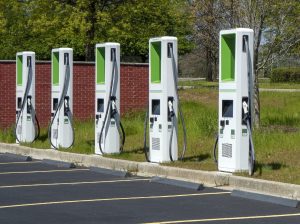Governors support electric vehicle charging network across Midwest
Chronicle Media — October 4, 2021
Through REV Midwest, the states will work together to remove barriers to electric medium and heavy-duty vehicles and enable EV charging across states by coordinating to optimize charging infrastructure.
Governors from Illinois, Indiana, Michigan, Minnesota, and Wisconsin have established of a partnership to collaborate on electric vehicle (EV) charging infrastructure across the Midwest region, signing the Regional Electric Vehicle for the Midwest Memorandum of Understanding (REV Midwest MOU).
The goal of the REV Midwest MOU is to collectively accelerate vehicle electrification in the Midwest Region. REV Midwest will provide the foundation for cooperation on fleet electrification along key commercial corridors to safeguard economic security, grow jobs, futureproof interstate commerce, reduce harmful emissions, improve public health, and advance innovation. The MOU also ensures the entire Midwest region is able to effectively compete for new private investment and federal funding for vehicle electrification.
“Illinois’ Climate and Equitable Jobs Act puts us on track to be the best state in the nation to manufacture and drive an electric vehicle – but we’re just getting started, and the work doesn’t stop at our state borders,” said Gov. J.B. Pritzker. “By working together with our Midwestern neighbors, we can accelerate the region’s growth in the transportation sector, create jobs across our communities, and prioritize the environment that makes the Great Lakes region so great along the way.”
REV Midwest will coordinate to promote clean energy and mobility manufacturing, leverage the states’ automotive industry electrification leadership, grow the region’s share of electric vehicle production, and elevate access to tools required to equip the workforce of tomorrow.
Through REV Midwest, the states will work together to remove barriers to electric medium and heavy-duty vehicles (MHDV) and enable EV charging across states by coordinating to optimize charging infrastructure, cooperate on best practices, and support standardization.
“Today’s REV Midwest partnership is a bipartisan effort to build the future of mobility and electrification and connect our communities,” said Michigan Gov. Gretchen Whitmer. “Our partnership will enable the Midwest to lead on electric vehicle adoption, reduce carbon emissions, spur innovation, and create good-paying jobs.”
“The Midwest has the ingenuity and the drive to develop innovative solutions to curb climate change,” said Minnesota Gov. Tim Walz. “I am proud to work with my fellow Midwest governors to not only reduce pollution, but protect public health, create jobs, and increase consumer choice across the region.”
An estimated 105,000 new jobs in the utility sector are anticipated to be needed to deploy EV charging infrastructure by 2030. The states will work together with industry to understand future workforce needs and support workforce training programs to build the transportation system of the future.
“As the Crossroads of America, transportation plays a vital role in Indiana’s economic success and continued growth,” said Indiana Gov. Eric J. Holcomb.
The REV Midwest is a multi-state compact to develop, operate, and market the region and strategically develop an EV charging infrastructure network that works for industry and people, the release stated from Pritzker’s office.
The network will initially focus on interstate and regionally significant commercial corridors and creating publicly accessible charging opportunities capable of serving MHDV where the Midwest can leverage our existing role as a shipping and logistics hub.
The MOU is meant to competitively position the Midwest for upcoming federal funding opportunities and create a welcoming environment for economic development and innovation around EVs, EV charging infrastructure, battery performance, and other technologies on the cutting edge of the transportation-energy sector convergence. These innovations and opportunities will be crucial to safeguard the region’s manufacturing economy in the long-term.
“We shouldn’t have to choose between building a cleaner, more equitable state and economic development—and thankfully, vehicle electrification is an area where we can do both,” said Wisconsin Gov. Tony Evers. “This regional partnership will be critical for addressing emissions from the transportation sector, ensuring folks in every community have cleaner air to breathe, and creating jobs to meet our future workforce needs.”







